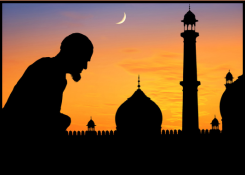
If you’re new here, you may want to subscribe to our RSS feed
Thanks for visiting!
The biggest Muslim festival, Eid Ul Fitr (also known as Eid al-Fitr), literally means ‘festival of breaking the fast‘.
It is the first day of the month of Shawwal in the Hijri year (Islamic calendar), concluding the month long fast of Ramzan / Ramadan, the holy month.
Eid ul fitr Dates
Eid ul fitr in 2013: 7-August-2013
Eid ul fitr in 2014: 28-July-2014 
According to the Islamic tradition, there are two festivals observed by Muslims every year – Eid-ul-Fitr just after Ramzan and Eid-ul-Zuha in the month of Haj.
Significance of Eid Ul Fitr
The legend associated with Ramzan and the festival of Eid relates to the time when Allah gave Prophet Muhammad the Holy Quran during the holy month of Ramadan. One day, Muhammad had a vision in which the angel Jibri told him how Allah (God) wanted him to live. Allah’s words are revealed to Muhammad through the angel and the words are written down to form the Quran. Ramzan is celebrated to remember this special month. Eid Ul Fitr is a joyous occasion celebrated by millions of Muslims around the world.
How is Eid ul Fitr celebrated
It is forbidden to fast on the Day of Eid. It is customary to acknowledge this with a small sweet breakfast, preferably of the date fruit. Men, attend a special Eid Prayer at the Idgah (mosque). As an obligatory act of charity (fitra, zakat), money/food/new clothes are distributed amongst the poor and the needy before the Eid prayer. Fitr, meaning donation, is a must for every Muslim. The prayers are followed by the Imam (spiritual head) delivering a discourse on social and family duties, after which people greet each other by saying “Eid Mubarak” (Happy Eid!), followed by a formal embrace.
Meanwhile, womenfolk offer prayers at home on the Eid morning, dress up in fine silk and ornaments and prepare a lavish spread of eatables including the traditional Sevai (vermicelli cooked in milk and sugar), dry fruits, sweetmeats and meat Biryani (Meat cooked in spicy rice), among other dishes.
Children enjoy their Eidi (gifts / money received from elders of the family).
Popular Eid customs also include decorating one’s hands with henna, dressing up in new clothes and having a good meal with family and friends. Rituals vary a little from country to country, but the basic spirit of charity, unity and equality is unanimous.
Eid indeed is a perfect occasion for family reunions. It is a good time to bring people together in harmony and gratitude. 
Eid Mubarak! 
Continue to read >>
|